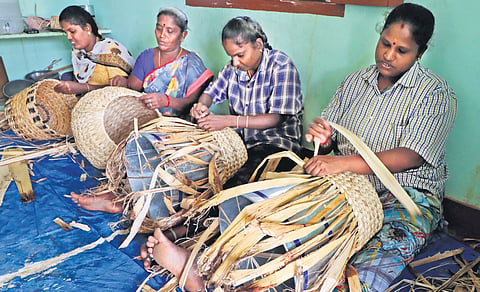Where banana fibre weaves the future
MADURAI: Chuckles fill the air as a motley crowd of women, sitting under the shade of a tree, exchanges jokes and pleasantries, while their fingers twist and flex in a uniform rhythm. Holding a string of dried banana fibres, they envisage beyond the ordinary and transform the so-called ‘useless’ fibres into prized products.
This is the daily routine one finds at the Madurai International Centre for Arts (MICA), a dedicated organisation that empowers rural women by offering them training and employment in the production of sustainable banana fibre utensils, in Tiruparankundram. What many consider as garbage gets skilfully woven into over 20 kinds of utensils and other products, including baskets and lamp shades, thanks to the expert artistry of these women.
MICA, the brainchild of R Charlas of Tiruparangundram in Madurai, began as a small initiative in 2017 with only 12 members. Over a course of six years, the organisation grew drastically, and at present, MICA employs nearly 80 women, who have been trained in weaving the products, which are then exported to several countries including the US.
Shedding light on how he stumbled upon the idea for the initiative, 29-year-old Charlas said, “Back in my village, I often saw people using banana fibre as rope to tie green fodder and as strings for garlands.
That is when the flexible and durable nature of the fibre struck my mind, and I decided to give a shot at using it for making handicrafts. With my sister Selvi’s help, our maiden basket made out of banana fibre turned into reality and its success later extrapolated into the setting up of MICA, with an aim to empower women.”
The whole process of procuring the fibre, Charlas says, begins right after the harvest. “Once the banana trees are cut down, we separate the fibre from the stem, dry it under the sun, weave the baskets and sell them. The price scale ranges from `135 per basket, while rates vary for other products,” said Charlas, who had also painted a portrait of Chief Minister MK Stalin on a canvass made out of banana fibre and gifted it to MP Kanimozhi Karunanidhi recently.
For Charlas, MICA is not merely a business enterprise, rather a space for women to empower themselves.
“A majority of the women who work at MICA are single mothers or the ones abandoned by their husbands. After training, they are employed here and are provided with a decent salary based on available orders. With the summer season kicking in, the availability of banana fibres has risen and hence it is a prosperous time for our business,” he added.
Speaking to TNIE, Selvi, a MICA employee whose husband has been lodged in jail, said, “After my husband got imprisoned, my relatives supported me initially. Later on, I started facing financial troubles and decided to join MICA to provide for my family. At first, weaving using banana fibre was a bit difficult. However, it became easier with practice.”
Meanwhile, for Charlas, who has dedicated years of his life for MICA so far, the next step is to source financial assistance from the state government to expand his mission. “If the government could offer financial support through schemes or other projects, then we will be able to provide a sustainable source of income for more rural women,” he says, eyes brimming with hope.
(Edited by Arya AJ)

